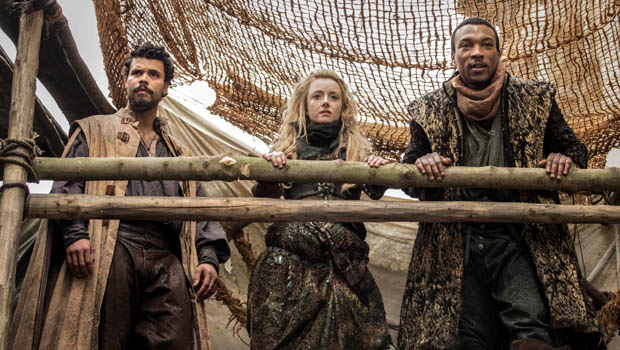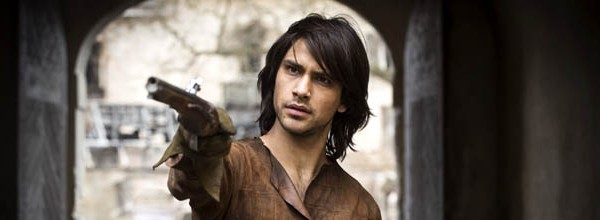The episode starts with his waking up after a heavy night out, next to the body of a dead man and a melon. Tried by Michael ‘Inexplicably Isn’t In Everything’ Cochrane’s racist judge, Porthos is sentenced to death, but is kidnapped by masked men before this can be carried out. Taken to his childhood home, The Court of Miracles (a real-life location that also inspired Les Miserables and The Hunchback of Notre-Dame); a poverty-stricken slum area of the city.
Compared to ‘Commodities’, the treatment of poverty, race and migrants is a lot more subtle, with Ashley Walters’ Charon providing a counterpoint to Porthos’ backstory. During a fight Murray Gold’s music gives the scene a strangely melancholy air that sums up the relationship between the two characters. However, this isn’t the Howard Charles show. The rest of the Musketeers try to prove Porthos’ innocence.
What ‘The Homecoming’ actually does very well is divide screen time between the Musketeers evenly, excising a few of the regular supporting cast and giving the story more room. Despite this we still have time for the King and the Cardinal to pop by – always a good thing, even if the Cardinal must be starting to suspect that everyone he enters into a business deal with seems to have an unexpected bout of bad luck – and again the guest female character isn’t killed off just when her character started getting interesting.

The Musketeers themselves now feel well-defined, with Aramis getting most of the punchlines, D’Artagnan being endearingly blunt, and Athos being so unflappable that you’re shocked if one of his eyebrows moves. Obviously, being telly, everyone is more urbane and ready to cackle after a pause near the end of the episode, but there’s depth to them too. Little moments, like glances between Porthos and Aramis after one saves the other’s life, say a lot.
Also of note is the way the historical setting is deployed, with some background detail to social and religious life in Seventeenth Century Paris. It’s entertaining and educational, as if writer James Dormer has taken Doctor Who‘s original remit to heart.
As a result, when the exposition does clunk or the contrivances are contrived, it’s more noticeable because it’s a lot rarer in this episode than previously. The interactions feel more natural, characters more real, surprises land successfully, and the complexities are actually complex.
This week The Musketeers feels like everyone’s comfortable in their roles, and the show has gone up to a higher gear.
![]()
Aired at 9pm on Sunday 23 February 2014 on BBC One.
> Follow Andrew Blair on Twitter.
What did you think of the episode? Let us know below…

